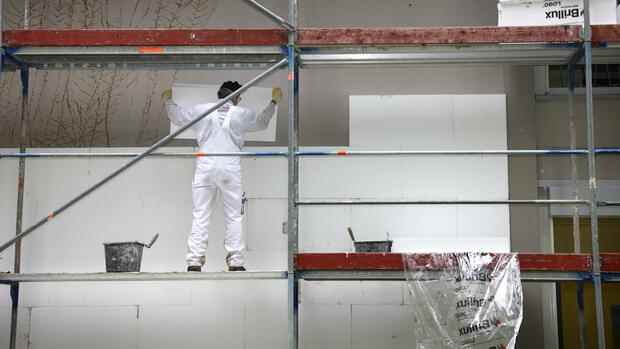The federal government had recently decided to change its multi-billion building subsidies.
(Photo: imago stock&people)
Berlin In the future, only the purchase of energy-efficient new buildings will be subsidized by the state. Buyers of existing buildings will get nothing. This was confirmed by the Federal Building Ministry (BMWSB) by Klara Geywitz (SPD) on Monday in Berlin.
“The money that we receive for the new building subsidies comes from the climate and transformation fund,” explained the head of the housing department at the BMWSB, Annett Jura. “This means that these funds may only be spent on energetically sensible promotions.”
Families would invest primarily by buying existing apartments and houses, said Jura. But the Federal Ministry of Economics takes care of existing buildings. And here, too, in the future there will only be funding for energy-related refurbishment measures: “The purchase itself will not be funded.”
Baukindergeld also expires
The federal government recently decided to change its multi-billion building subsidies: the focus will now be on renovations. Here, twelve to 13 billion euros are to flow annually, under the responsibility of Federal Minister of Economics Robert Habeck (Greens). Only one billion will be spent on new construction, combined with high standards for energy-efficient construction. Geywitz is responsible for the funding programs.
Top jobs of the day
Find the best jobs now and
be notified by email.
Most recently, the Minister of Construction prematurely scrapped the Baukindergeld, a subsidy for owner-occupied housing for couples with children and single parents. Since September 2018, households with a maximum income of 90,000 euros for one child or plus 15,000 euros for each additional child have been able to apply to the state development bank KfW.
>> Read here: Fewer permits for residential construction – experts see “precarious situation”
The funding will now expire on December 31, 2022 at the latest. According to the Ministry of Construction, around 180 million euros were still available. A total of 9.9 billion euros has been available for the child benefit since the start of the funding. The acquisition of new buildings and existing buildings was funded.
The Minister for Housing, Urban Development and Building has laid down the cornerstones for future home ownership promotion.
(Photo: dpa)
From June next year, 350 million euros will be available for future home subsidies for “threshold households”, as BMWSB’s Jura department head confirmed on Monday. This means families with one child and a maximum taxable annual income of 60,000 euros. Each additional child increases the threshold by 10,000 euros.
“We will extend low-interest KfW loans,” said Jura. These should undercut the market interest rates “by two points”. Existing buildings could no longer be bought in this way, but only new buildings with efficiency house standard 40 (EH40) plus a quality seal for sustainable building. EH40 means that a building only uses 40 percent of the energy that a legally defined standard house requires.
Another 650 million euros are intended for all other applicants, i.e. for housing groups, cooperatives or higher earners.
Desired housing is usually not implemented in new buildings
The fact that the federal government will no longer subsidize the purchase of existing buildings raises questions. Because an inventory of home ownership by the Federal Institute for Research on Building, Urban Affairs and Spatial Development (BBSR), which was presented on Monday, shows that the housing wishes are usually not implemented in new buildings.
There are various reasons for this – from the ability to finance it to the purchase offers and the location advantages of the property. The study states: “Home ownership therefore usually takes place in the form of used real estate.”
>> Read here: Outlook for construction is gloomy – companies report financing problems
The main findings of the study, which was commissioned by the ministry and is based on a representative survey by the market research institute Kantar: Many people in Germany want to own their own home and prefer a detached single-family house in particular.
- Around 390,000 households currently buy their own home in Germany every year, including 197,000 households with children.
- The ownership rate has not increased for about ten years and is 46.3 percent.
- Home ownership is predominantly in used real estate. This trend has intensified in recent years. Used properties are usually cheaper than new builds. 56 percent of buyers acquired their property in the portfolio. 23 percent inherited an object or received it as a gift. This means that the share of existing properties in home ownership is 79 percent. The remaining 21 percent is accounted for by new construction. In the years before the turn of the millennium, new construction still predominated at more than 50 percent.
- The desire for a detached single-family house is particularly great. 45 percent of the households surveyed owned their own home in this segment in the period from 2018 to 2021 – and thus significantly more than, for example, at the beginning of the 1990s with 25 percent. 19 percent opted for a semi-detached house, 17 percent for a condominium, 13 percent for a terraced house.
BMWSB department head Jura said that with the corona pandemic and Russia’s war against Ukraine, the buyers were now faced with completely different framework conditions. Politicians have to react to that. Rising building interest rates are now making the situation more difficult for buyers of residential property. She added: “We also have to think about energy targets, climate protection and land use.”
More: “30,000 euros more for a normal single-family house” – the construction industry fears a massive slump in orders
